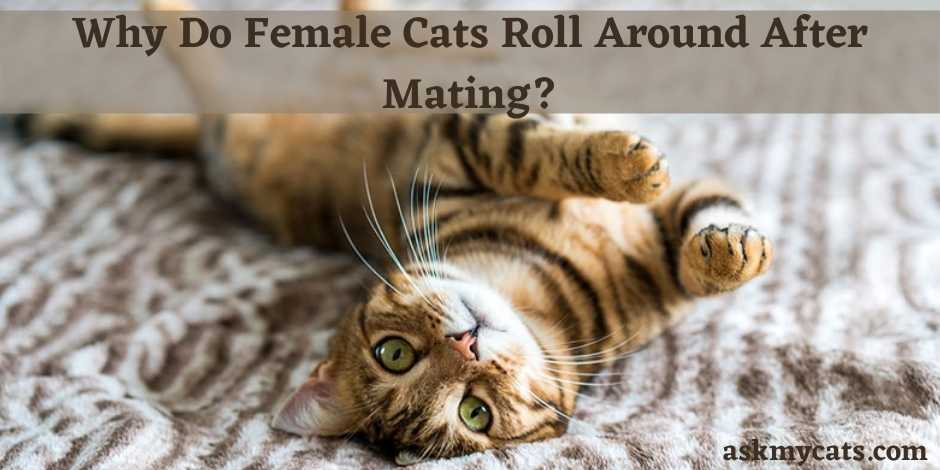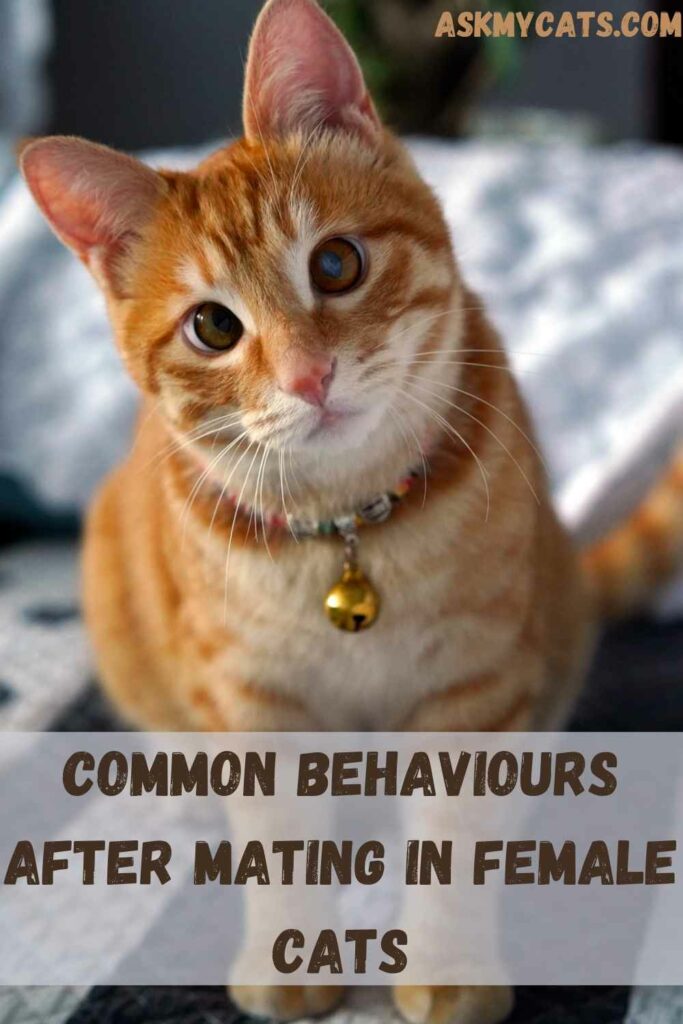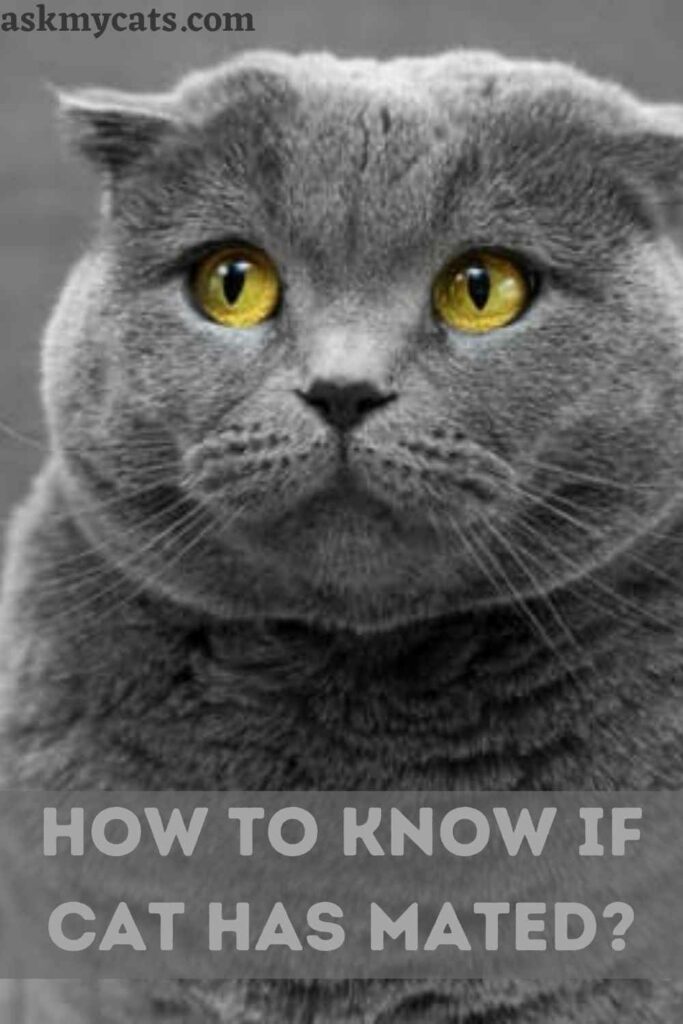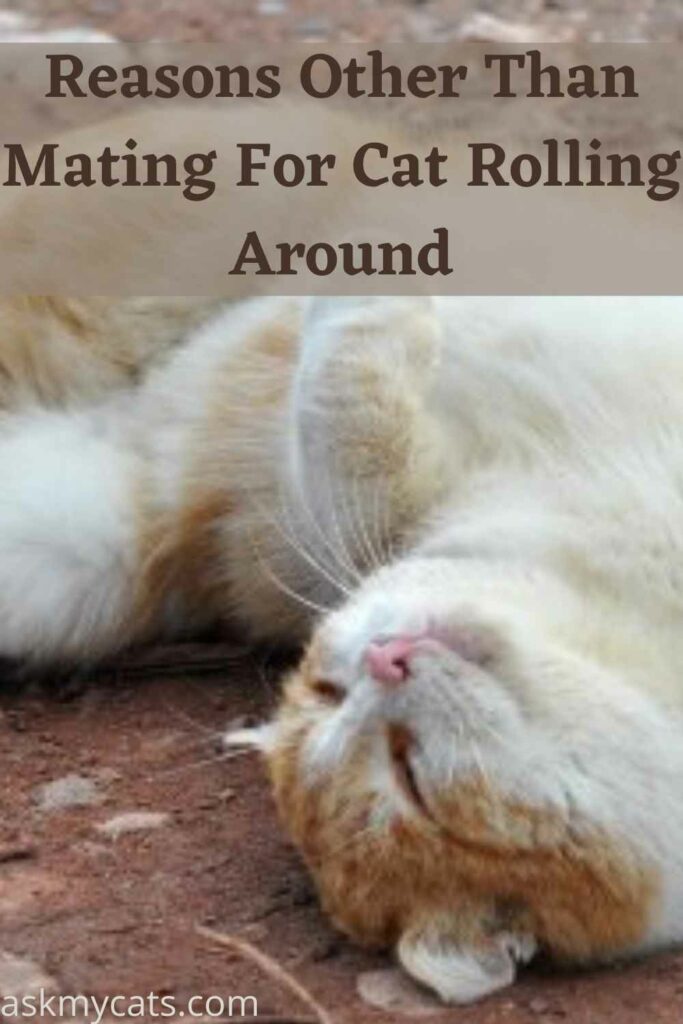The great majority of cat owners get their cats spayed or neutered. And rightfully so! In the United States, there are millions upon millions of homeless cats, and as responsible cat owners, we should try our hardest not to add to the problem.
However, Suppose you have a cat that is not spayed that you unintentionally or purposefully breed.
In that case, you’re likely to see a variety of odd mating behaviors, like rolling around after mating. So, why do female cats roll around after mating?
Female cats roll around after mating, as after intercourse, female cats are overcome with a frenzy of hormones. This rolling around may be a release of all that nervous and excess energy.
Keep reading the article to know all about why do females roll after mating and is it normal.


Give Your Cat the Perfect Day
Get the Free Ebook!
Reason Behind Rolling Of Female Cats After Mating
The reason behind the rolling of female cats after mating is female cats are engulfed in a hormonal frenzy. Rolling around could be a release of this nervous and excess energy.
Female cats are the only ones who roll after mating. When the male cat has completed his task, he frequently flees as quickly as possible.
Female cats will frequently roll around furiously on the floor after mating. They will rub their faces and bodies on the floor, the couch, and anything else they can get their hands on.
It may appear strange to do so after sex, but female cats know what they’re doing.
Female cats experience a hormonal frenzy following intercourse. This rolling around could be a release of nervous and excess energy.
It could also be a way for a female cat to get rid of the odor of her male counterpart.
She wants to be sweet and clean for her next suitor because female cats can only mate once every 30 minutes or so (which is why some kittens from the same litter have different fathers).
If she still smells like another male cat, a male cat will be unlikely to approach her.
Don’t be alarmed if you see your female cat rolling around on the floor after mating. It’s completely normal, and she’ll probably stop after about ten minutes.
You would also like to read about why do cats scream when mating
How Long Does Cats Mate?
Cats will usually mate for about one minute.
Cats mate extremely quickly. That’s a good thing because neither animal wants the process to take too long, and mating can leave wild cats vulnerable.
Mating takes less than a minute for most cats, though it can occasionally last longer. You may also notice your cats in a mating position for a longer period of time if a fixed male tries to mate with an intact female, though this is not always the case.
Common Behaviours After Mating In Female Cats
Female cats display a combination of behaviors after mating, and some of them are: –

- Female cats can appear strange immediately after mating. They exhibit a wide range of behaviors that are completely out of character at other times but occur every time they mate.
- It’s important to remember that after mating, your female cat can be pretty unpredictable. She may even be more aggressive with you until she has had a chance to calm down, so approach a newly mated Queen with caution.
- Female cats will frequently actively scare away a Tomcat that lingers too long after mating. This is because she requires some time to react to the hormones released during the initial mating, and it takes some time for her to be ready to mate again.
- After Tom has left, most Queens will alternate between grooming themselves, including their private parts, rolling around, and calling. She may appear to move unusually quickly between actions, partly due to the same hormones flooding her body and confusing her.
- However, as the Queen prepares to mate again, this frantic period often passes relatively quickly. Most Queens will mate 3-4 times in 1-2 days. They may be ready to mate again in as little as 30 minutes and will begin calling to entice the Tomcat once more.
- On the other hand, Cats aren’t usually picky about who comes to mate when they’re ready, so it’s common for Queens to mate with multiple males if there is more than one available. There could be several fathers in a single litter of kittens.
Must Read: Cat Behavior After Mating: Do Cats Act Differently After Mating?
What Do Male Cats Do After Mating?
After mating, male cats eagerly move away from the female.
The male is usually eager to get away from the female after mating. He frequently flees the scene.
The female has made it clear that she does not want him near her, and if the mating results in kittens, he will not be involved in their care. He will return to mate once she is receptive again, which should take about half an hour.
How To Know If Cat Has Mated?
You can know if a cat has mated by the loud and raucous sounds they make while mating.

Given how loud and raucous kitty mating can be, it’s unlikely that you won’t notice your cats mating if you’re in the same house at the time.
However, if you miss the moment of sensual passion, it can be difficult to tell whether or not your cats mated and subsequently conceived a litter of kittens.
Cat pregnancy lasts only about 63 days, so you’ll find out if your cat is pregnant soon!
Kittens are most commonly born during the warmer months, but kitty mating can occur at any time of year.
If you are a cat breeder, you should think about investing in a pet ultrasound machine.
While they are not cheap, they are an invaluable tool for determining whether or not your cat is pregnant. You might even be able to guess how many kittens she’s having.
You might also like to read about Do Cats Stay In Heat After Mating? How Long Do Cats Stay In Heat?
Reasons Other Than Mating For Cat Rolling Around
There are several reasons other than mating for a cat’s rolling around. Some of them are Feeling safe, attention-seeking, marking, catnip, and never-ending possibilities.

Let us study the above-mentioned reasons in detail: –
1. Feeling Safe
A cat will not roll over on its back unless it is in a safe and secure environment.
In fact, when a cat is at its most calm, it will roll over on its back. Consider it kitten zen mode.
It’s a positive indication that a cat turns over in front of you. This is your cat’s way of telling you, “I believe in you.”
Exposing your cat’s tummy and sensitive regions is a vulnerable moment for him, but it also provides an opportunity for you to bond.
2. Attention Seeking
Take into account the timing, location, and events that may cause your cat to roll over.
If your cat, for example, flops over in front of you every morning as you get ready for the day, this is an indication that it needs some attention. If your cat is rolling on its back, your feet, or on the floor, spend some quality time with it.
Giving your cat that attention is positive reinforcement of the activity, and it “pays” the cat for rolling.
As a result, the next time additional attention is desired, your cat will repeat the rolling movement. Cats thrive on routine, so rolling becomes a soothing habit once a pattern is established.
3. Marking
The scent of the cat can be dispersed by rolling on the ground. Cats use their scent glands on their faces, paws, and flanks to imprint a personal aroma on things since they communicate largely by how someone or something smells.
Both domestic cats and wild cats exhibit this behavior.
When your cat rubs its head and cheeks on the floor, it is possible that it is leaving scent markers all around the house and on your feet.
This alerts other cats that you’ve arrived, claimed your territory, and have already left your mark (so other cats need to back off). Marking serves as a deterrent to any possible adversaries or competitors.
Many cats have an instinctual desire to scratch and rub their territory to indicate their territory. If your cat is marking territory with pee, though, you should teach him to stop.
4. Catnip
You may have witnessed similar rolling behavior if you’ve ever given your cat catnip. Cats frequently have a strong sensitivity to the catnip herb.
Its key ingredient, nepetalactone, is a strong odor that stimulates a cat’s sexual instincts. This is why, after inhalation, they prefer rolling around on the ground.
5. Limitless Possibilities
Your cat’s rolling around on the ground could be due to a variety of factors. Cats would likely sunbathe or sleep near a heater because they have a greater body temperature.
As a result, cats may become overwhelmed by the sensation and feel the desire to chill down. Drinking a lot of water, sitting in cool settings, and rubbing on cool floors are all examples of this.
Rolling around in the mud, covering its fur with microorganisms, and consuming it by licking its coat could also be protecting your cat’s digestive system. Whatever your cat is doing is likely for a good purpose.
How To Take Care of Mother Cat And Kittens After The Birth
You can take care of the mother cat and her kittens after birth by: –
- For your mother cat and her newborn kittens, the first two to three weeks are critical. The kittens should be growing quickly at this point, and the queen should be showing signs of any postpartum issues.
- Keep the queen and her kittens in a peaceful area of the house, preferably a separate room, and make sure it is warm enough. One of the most serious threats to newborn kittens is chilling.
- Allow the mother cat to set the tone for your focus. She may enjoy your visits if she has been a long-time companion and resident.
Also, check out Why Do Female Cats Attack Males After Mating?
Frequently Asked Questions
What are the things to keep in mind owing an intact cat?
Ans. It is possible to be a responsible owner of an intact cat, but it is more work than owning a fixed cat. For starters, make sure that there are no opportunities for your intact cat to escape. To avoid accidental breeding, keep intact cats separated by sex during heat cycles. Finally, and most importantly, if you choose to keep intact cats for any reason, you must be prepared to find good loving homes for any kittens that are born, whether by accident or on purpose.
What are the signs that my female cat is ready to mate?
Ans. Signs that a cat is in heat; she’s signaling to all males within the range that she’s looking for a romantic connection. She also has a ready-for-action body posture with her tail and back end lifted. She’ll rub her head and body against you, a convenient chair, or other cats in your home, becoming more loving. She may also appear agitated.
How long does it take for a cat to exhibit indications of pregnancy after mating?
Ans. Your cat’s nipples will become larger and red/pink around two to three weeks into pregnancy. Morning sickness: Cats, like people, can suffer from morning sickness while pregnant. She could have a period of vomiting or lethargy.
Final Words
It’s not always evident why a female cat rolls after mating. Of course, it’s a response to mating and the hormones linked with ovulation.
Still, rolling behavior could be a technique for her to de-stress, disseminate her scent, or even try to get rid of the Tomcat’s scent in case another male cat is interested in mating.
While there are a variety of theories as to why female cats roll after mating, one thing is certain: it’s a completely natural response to mating and nothing to be concerned about.
If you have any unanswered questions, feel free to ask us in the comments section.
Must Read: Pregnant Cat Rolling On Back: Reasons & Solutions
